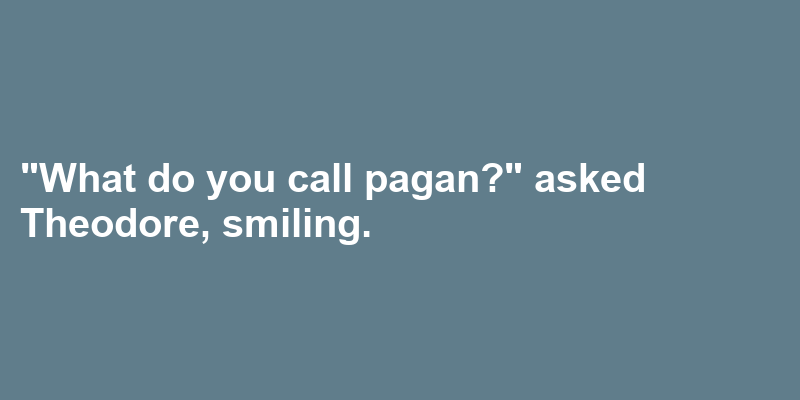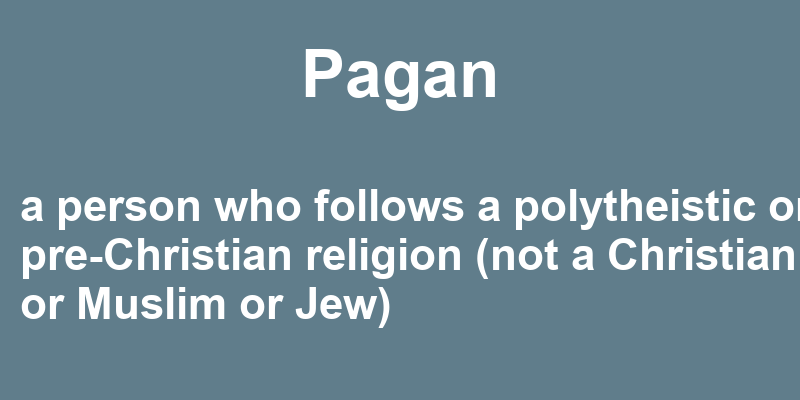Definition of Pagan
pagan (noun) - a person who follows a polytheistic or pre-Christian religion (not a Christian or Muslim or Jew)
View other definitions
How can pagan be used in a sentence?
"What do you call pagan?" asked Theodore, smiling.
Source
nullThese are not peculiar to what we call pagan people.
Source
nullIt appears also that certain pagan rites were still observed.
Source
nullThough I identify as pagan, I'm not sure that's entirely fair.
Source
nullThe Christmas tree was equally common in pagan Rome and pagan Egypt.
Source
nullProbably she didn't know the word pagan, and didn't care enough to ask.
Source
nullAnd pagan is too generic, and I don't think appropriate for the story I need this for.
Source
nullSo on the ride home mom and Laura made 2 or 4 remarks using the word pagan or paganism.
Source
nullCurses are not remote in pagan antiquity nor lost as a means of expressing religious feeling.
Source
nullOther theories imply that the cross symbolizes the four quarters of the moon, important in pagan ritual.
Source
nullThe so-called pagan virtues have their value for Christian character and are in the line of Christian virtue.
Source
nullTo them the pagan was the incarnation of all that is vile, a creature whose every act was dictated by the devil.
Source
nullThe word pagan originally referred generally to believers in non-Christian deities, such as the gods of ancient Rome.
Source
nullI do not appreciate being called a pagan by this "gentlemen" and I shall be staying well clear of his horrible videos.
Source
nullHayes also identifies as a pagan, Waddell noted, adding that he is "primarily known to friends and colleagues as Purple Crow."
Source
nullThe gods change their names, but hush! hush! talk not of Odin and of Freya, for I say that it is heresy, or pagan, which is worse.
Source
nullThe joyous substratum of his nature (what he himself called his pagan self) broke through its sombre integuments and asserted itself.
Source
nullMr. Caldigate should be what he called a pagan had been represented by Mr. Bromley to his friends as a great misfortune, and especially
Source
nullIt was Rome that crucified Christ; that destroyed Jerusalem and scattered the Jews; that persecuted the early Christians in pagan times, and
Source
nullThe word pagan simply means country-dweller, although many contemporary neo-pagans are urban dwellers, as were many pagans in classical times.
Source
nullIt is interesting to note many Christian holidays blend together with more ancient or "pagan" holidays celebrated for thousands of years prior.
Source
nullAt the time at which we are arrived no pagan, that is to say, no man without some anterior connection with Judaism, had entered into the Church.
Source
nullBTW, all the things you find detestable in so-called pagan humour is found unabated in Chaucer and the Decamaron and the other medieval story-tellers.
Source
nullTake for example, on the way home, when mom asked me something involving the word pagan (remember, I was literally stoned out of my gourd on adrenaline).
Source
nullThe other bit of irony is that Beowulf was a story probably originally told in pagan times with a thin verneer of Christian rhetoric layed over the top sometime later.
Source
nullWith these three examples I conclude the section of my work which deals with what may be called the pagan conception of a library in the fulness of its later development.
Source
nullThat Mr. Caldigate should be what he called a pagan had been represented by Mr. Bromley to his friends as a great misfortune, and especially a misfortune to the squire himself.
Source
nullThus, e. g., a non-Catholic might not know that a Catholic priest may not, in general, baptize a pagan child without its parents 'consent, nor an adult without proper instruction.
Source
nullOf course, while some Jewish leaders are not so happy about Harry, many Christian leaders seem to be OK with what some had called the pagan worship and witchcraft depicted in the books.
Source
nullIn spite of the fact that he was an Asiatic by nature, he despised what he called the pagan ceremonies of the ritualists, and distrusted what he felt to be the atheistic tendency of science.
Source
nullHis original Roman Catholic Church labeled many things as "pagan" or "heretical," or worse, and oppression and persecution of everyone who did not swear obedience to the church's authority began.
Source
nullAfter all, these terms -- "savage," "heathen," "pagan" -- mean, alike, simply "country people," and point to some old-time superciliousness of the city-bred, now confined, one hopes, to such localities as Whitechapel and the
Source
nullIt would seem that our so-called pagan leaders today are more concerned about blogging about their next big event, copyrighting witchy graphics and racking up friends than finding enlightenment and being there for their followers.
Source
nullThe worship of all other gods the Christians held to be sinful idol-worship, a deadly sin in the eyes of God, and they were willing to give up their lives rather than perform the simplest rite of what they termed pagan worship (R. 28).
Source
nullOur heroes and heroines became heroes and heroines not because they distanced themselves from what our oppressors had defined as our pagan past, or because they sought approval for what they thought and did from those who had oppressed them.
Source
nullIn fact the early Christians felt but little need for the type of intellectual education provided by the Roman schools, and the character of the educated society about them, as they saw it, did not make them wish for the so-called pagan learning.
Source
nullDanes and Scandinavians who under the name of Normans formed a part of Christendom, never called pagan Danes or Scandinavians to their aid unless threatened in the possession of Normandy; under their domination the land became a stronghold of Christianity.
Source
nullAntichrist that according to Christianity, in the distorted version propagated by the catholic church and a totally anti-natural philosophy, everything close to nature and to life, the pagan, is automatically labelled as the work of the devil, God's eternal adversary.
Source
nullThese favelas are populated by very poor outcasts from surrounding Mayan municipalities who were expelled from their communities because they converted to protestantism and refused to obey traditional village elders whose dogma was grounded in pagan/catholic tradition.
Source
nullThe things I was shown have echoes both in pagan and Christian tradition, both Eastern and Western (although, with apologies to my pagan friends, I see that Christianity is the clearest expression of these themes, and also has a logical and ethical character other religions expressions lack).
Source
nullThey asked the people of Europe to desert and betray all that their fathers had taught them -- they throned their gold deities on their empty altars, and at the end sowed the seeds which came to their flowering in pagan Germany and now has come to our forefront in the godlessness of Communist Russia.
Source
nullIt is now apparent that the ecological pragmatism of the so-called pagan religions, such as that of the American Indians, the Polynesians, and the Australian Aborigines, was a great deal more realistic in terms of conservation ethics than the more intellectual monotheistic philosophies of the revealed religions.
Source
nullThey got their information from (1) some of the Latin patristic authors, like Tertullian, Ambrose and Boethius, who wrote before the knowledge of Greek effectively disappeared in the West, and who often discuss classical Greek doctrines in some detail; and (2) certain Latin pagan authors such as Cicero and Seneca, who give us
Source
nullThe conscience of a pagan was a conscience pointing to detection: it pointed only to the needs of society, and caused fear, shame, anxiety, only on the principles of sympathy; that is, from the impossibility of releasing himself from a dependence on the reciprocal feelings -- the rebound, the dependence on the _re_sentments of others.
Source
nullSo did our ancient Fathers term the pagan virtues, virtues and non-virtues both together; virtues, because they had the lustre and appearance of them, non-virtues, because they not only lacked the vital heat of the love of God, which alone could perfect them, but they were not even capable of it, because they were in persons without faith.
Source
nullThe Tuscarora of New York being completely isolated from any of their own people who still profess their ancient dogmas and beliefs and who still practice their ancient rites and ceremonies, have preserved only a hazy recollection of their early customs, ceremonies, and rites; even less do they comprehend the meaning of the ceremonies still practiced by the so-called pagan members of cognate tribes.
Source
null
Tips for Using pagan in a Sentence
You may have an easier time writing sentences with pagan if you know what words are likely to come before or after it, or simply what words are often found in the same sentence.
Frequent Predecessors
Words that often come before pagan in sentences. For example: "the pagan" or "a pagan"
- the
- a
- of
- and
- in
- to
- their
- old
- from
- with
Frequent Successors
Words that often come after pagan in sentences. For example: "pagan and" or "pagan ."
- and
- .
- world
- gods
- religion
- worship
- or
- rome
- temples
- religions
Associated Words
Words that aren't necessarily predecessors or successors, but are often found in the same sentence.
- wicca
- paganism
- wiccan
- witchcraft
- teutonic
- rites
- idols
- christianity
- gods
- rituals
Alternate Definitions
- pagan (noun) - one who is not a christian or a member of a christian community; in a later narrower sense, one who does not worship the true god—that is, is not a christian, a jew, or a mohammedan; a heathen. see the quotation from trench; see also <internalxref urlencoded="paynim">paynim</internalxref>
- pagan (noun) - a heathenish or ungodly person; in old slang, a prostitute
- pagan (noun) - <strong>synonyms</strong> <em>heathen</em>, etc. see <internalxref urlencoded="gentile">gentile</internalxref>, n
- pagan (noun) - one who worships false gods; an idolater; a heathen; one who is neither a christian, a mohammedan, nor a jew

